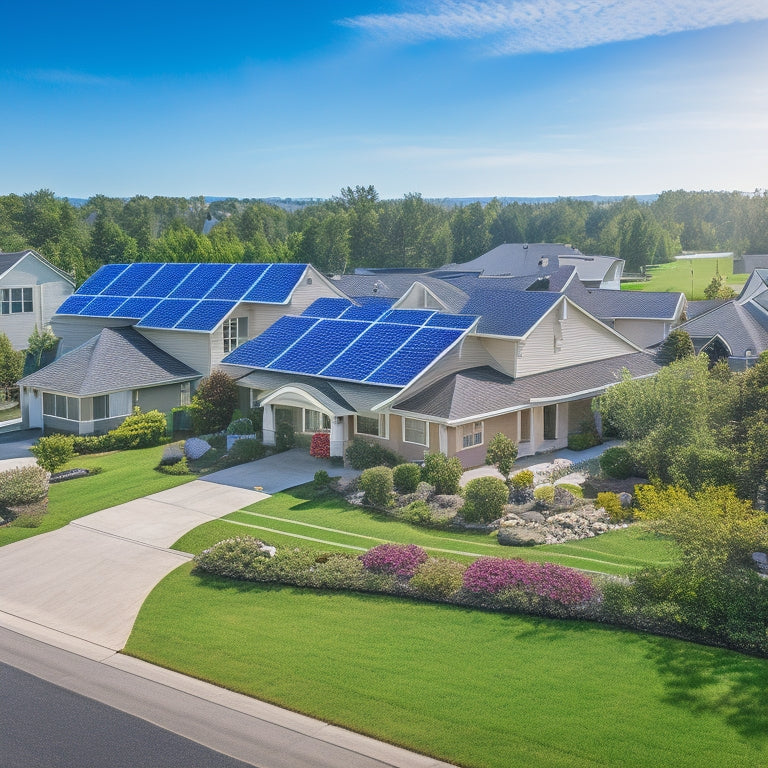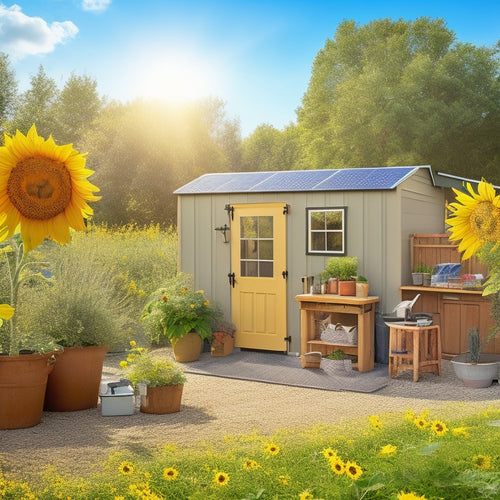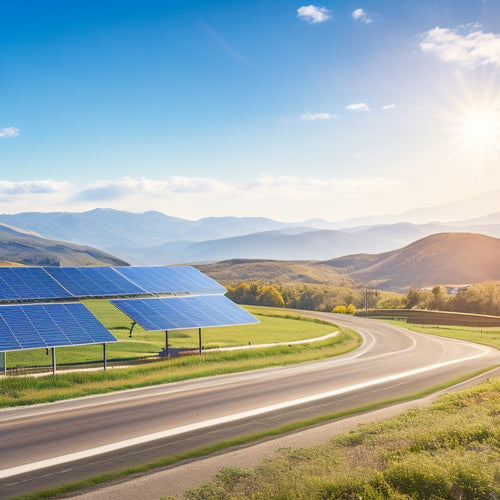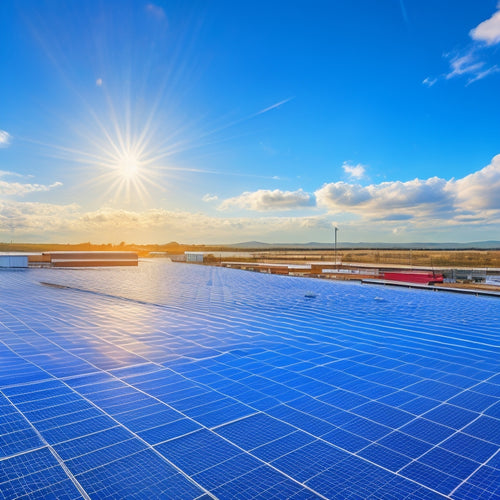
Solar Power for Homes Price
Share
You're considering installing solar power for your home, which can greatly reduce your carbon footprint and energy bills, with systems now more affordable than ever, costing between $15,000 and $30,000 on average, depending on the size and quality of the installation. By switching to solar, you'll enjoy immediate savings on energy costs, reduced reliance on fossil fuels, and a lower carbon footprint. High-efficiency solar panels are increasingly available, and government incentives like tax credits can notably reduce the upfront cost. As you weigh your options, it's crucial to comprehend the benefits and factors that impact solar power for homes, and there's more to investigate.
The Essentials
- The cost of solar power for homes varies depending on system size, quality, and installation company, with prices ranging from $15,000 to $30,000.
- Federal tax credits can significantly reduce the upfront cost of solar systems, with homeowners eligible for credits up to 26% of the total cost.
- The decreasing cost of solar panel systems encourages more homeowners to switch, with prices dropping by over 70% in the last decade.
- Solar power leads to immediate savings on energy costs post-installation, with homeowners saving up to 90% on their energy bills.
- While initial installation costs are high, long-term savings outweigh the investment, leading to a strong return on investment and increased property value.
Zero Carbon Footprint
As you investigate the benefits of solar power for your home, you're likely motivated by the desire to reduce your carbon footprint. By investing in solar energy, you'll greatly decrease your reliance on fossil fuels, leading to substantial carbon emission reduction.
With the help of integrated photovoltaic systems and power storage, you can enjoy a reliable source of renewable energy for your home or outdoor excursions Renewable Energy Solutions.
Carbon Emission Reduction
Reduce your carbon footprint to zero by utilizing the power of solar energy in your home. By switching to solar power, you'll greatly reduce your reliance on fossil fuels, which are major contributors to greenhouse gas emissions. This shift won't only benefit the environment but also provide you with a sense of freedom from dependence on finite energy sources.
Additionally, residential renewable energy solutions like solar panels can help you save money on your electricity costs and reduce your vulnerability to power outages and fluctuations in energy prices Energy Efficiency.
Implementing emission reduction strategies is vital in the current era. You can achieve this by adopting sustainable living practices, such as using energy-efficient appliances, turning off lights when not in use, and insulating your home.
Solar energy will further enhance these efforts by providing a clean and renewable source of power. With solar panels installed, you'll be generating electricity without emitting any harmful pollutants or carbon dioxide.
Renewable Energy Sources
Your home can thrive on a zero-carbon footprint by utilizing the power of renewable energy sources. You're not limited to traditional fossil fuels to power your home; instead, you can tap into energy from natural resources like sunlight, wind, and water.
Solar technology, in particular, has become increasingly accessible and affordable, allowing you to generate clean energy and reduce your reliance on the grid. With professional solar panel installations, you can maximize your energy savings and guarantee a safe and secure installation process that comes with a warranty and ongoing maintenance support Solar Panel System Installation.
By incorporating renewable energy sources into your daily life, you're contributing to a sustainable future. You're not only reducing your carbon footprint but also promoting sustainable practices that benefit the environment.
With solar panels, you can power your home appliances, lighting, and even your electric vehicle, all while minimizing your impact on the planet. As you investigate renewable energy options, you'll find that the benefits extend beyond environmental advantages.
You'll also enjoy reduced energy bills, increased energy independence, and a higher property value. By adopting renewable energy sources, you're taking a significant step towards a cleaner, greener, and more sustainable lifestyle.
Lower Monthly Energy Bills
You'll start saving money immediately with solar power, as it reduces your energy costs.
With the cost of a solar panel system, including photovoltaic cells, inverter systems, and mounting hardware, becoming more affordable residential solar panel cost, more homeowners are making the switch.
By generating your own electricity, you'll rely less on the grid, which translates to lower monthly energy bills.
With solar power, you can expect to save hundreds or even thousands of dollars per year, depending on your energy usage and the size of your solar panel system.
Energy Cost Reduction
Installing solar panels on your home can lead to significant energy cost reduction, resulting in lower monthly energy bills. By generating your own electricity, you'll rely less on the grid, reducing your energy consumption habits and slashing your energy expenses.
A solar panel installation can offset up to 90% of your energy needs, depending on the size of the system and your energy usage.
With solar power, you'll enjoy predictable energy costs, shielding you from rising electricity rates. As energy prices continue to increase, your savings will add up over time.
Additionally, solar panels require minimal maintenance, ensuring consistent energy production and cost savings.
Save Money Now
One of the most significant benefits of solar power for homes is the immediate reduction in monthly energy bills. You'll notice the difference as soon as your solar panels are installed, and you'll be saving money from day one.
With solar power, you'll generate free energy from the sun, reducing your reliance on the grid and lowering your energy bills. This means you can allocate more funds to other essential expenses or put the savings towards your budget planning goals.
When calculating the cost-effectiveness of solar power, consider the installation costs against the long-term savings. While the initial investment may seem substantial, the return on investment is significant.
You'll be generating free energy for years to come, saving you money that would have gone towards electricity bills. By going solar, you'll be taking control of your energy expenses, gaining financial freedom, and enjoying the benefits of renewable energy.
With solar power, you can break free from the constraints of rising energy costs and invest in a brighter, more sustainable future.
High-Efficiency Solar Panels Explained
You're likely familiar with the concept of efficiency ratings when it comes to solar panels.
When choosing high-efficiency solar panels, you'll want to take into account their panel efficiency ratings, which measure how well they convert sunlight into electricity.
Many top residential solar panels, such as those from Tesla and SunPower, offer high-efficiency options that can greatly influence your energy output.
Panel Efficiency Ratings
Frequently, homeowners pondering solar power for their homes wonder what sets high-efficiency solar panels apart from their standard counterparts. The answer lies in their panel efficiency ratings. You see, high-efficiency solar panels are designed to convert more sunlight into electricity, resulting in higher energy yields and lower installation costs.
When comparing panel types, it's crucial to evaluate their efficiency ratings, which are measured in percentage. Here's a breakdown of some popular high-efficiency solar panels:
| Panel Type | Efficiency Rating | Installation Cost (per watt) |
|---|---|---|
| SunPower X-Series | 22.8% | $2.95 |
| Panasonic HIT-240 | 21.8% | $2.85 |
| Tesla Solar Roof | 21.5% | $2.75 |
| LG NeON 2 | 20.5% | $2.65 |
| Trina Tallmax M10 | 20.3% | $2.55 |
Energy Output Boost
High-efficiency solar panels maximize your energy output by converting more sunlight into usable electricity. With high-efficiency panels, you can generate more power per hour of sunlight, which means you'll need fewer panels to meet your energy needs. This is especially important if you have limited roof space or want to maximize your energy storage capacity.
High-efficiency panels are designed to optimize energy output, even in low-light conditions. They're built with advanced materials and technologies that reduce energy loss and increase energy conversion rates. As a result, you'll see higher energy yields and a faster return on your investment.
Regular system maintenance is vital to guarantee your high-efficiency panels continue to perform at their best. This includes cleaning the panels, inspecting electrical connections, and monitoring system performance.
Assess Your Roof's Shading
You'll want to evaluate your roof's orientation to guarantee it receives sufficient sunlight, as a south-facing roof receives the most direct sunlight.
You'll also need to identify shading sources, such as nearby trees, buildings, or chimneys, that could obstruct sunlight and reduce your solar panel system's efficiency.
Additionally, consider the importance of renewable energy systems in your overall energy strategy and how a well-designed solar panel system can lead to significant off-grid energy savings.
Roof Orientation Matters
What kind of impact does your roof's orientation have on its ability to capture solar power? The answer lies in the roof's slope and installation angle.
A south-facing roof with a slope between 15 and 40 degrees is perfect for solar panel installation, as it receives the most direct sunlight throughout the day. However, if your roof has a different orientation, don't worry - solar panels can still be installed and generate electricity.
The installation angle of your solar panels also plays a significant role. A tilt angle between 30 and 40 degrees allows for peak energy production.
If your roof has a steeper slope, the installation angle can be adjusted to compensate for the difference. Even with a less-than-ideal roof orientation, a skilled solar installer can design a system that maximizes energy production.
Shading Sources Identified
Beyond roof orientation, another essential factor to evaluate when contemplating your home's solar power potential is the presence of shading sources.
You'll need to identify any obstacles that could block sunlight from reaching your solar panels, reducing their energy output.
Conduct a shading analysis to determine the impact of nearby objects, such as trees, buildings, and chimneys, on your roof's solar exposure. This analysis will help you pinpoint areas of your roof that receive partial or full shade throughout the day.
You may need to trim trees or remove other obstructions to guarantee maximum sunlight exposure.
If removing shading sources isn't feasible, consider shading solutions that can minimize their impact.
For instance, you can install solar panels with built-in shading mitigation features or use microinverters that optimize energy production for each individual panel.
Government Incentives Boost Savings
You can considerably reduce your solar power system's upfront cost with federal tax credits.
These credits allow you to claim a percentage of your total solar panel system cost as a tax credit on your federal income taxes.
Federal Tax Credits
The federal government offers substantial tax credits to homeowners who invest in solar power systems, greatly reducing the upfront cost of going solar.
You're eligible for a tax credit if you've installed a solar power system in your primary or secondary residence in the United States. The tax credit amount is a percentage of the total cost of your solar installation, including equipment and labor.
You can claim the tax credit when filing your annual taxes. This credit can greatly offset your tax liability, providing substantial savings. To qualify, confirm your solar installation meets the tax credit eligibility criteria, such as using certified equipment and meeting specific installation requirements.
The solar installation benefits extend beyond the tax credits.
You'll also enjoy reduced energy bills, increased property value, and a lower carbon footprint. By investing in solar power, you're not only saving money but also contributing to a cleaner environment.
Take advantage of the federal tax credits and start utilizing the power of the sun to fuel your home.
Frequently Asked Questions
Can I Install Solar Panels on a Rented Property?
You'll need to negotiate solar panel agreements with your landlord, ensuring you understand tenant rights, as installing solar panels on a rented property requires their permission, and a clear agreement on maintenance, liability, and system ownership.
Do Solar Panels Affect My Home's Resale Value?
As you open the door to your eco-friendly haven, you'll find that solar panels are the golden key to enhancing your home's resale value, thanks to solar panel incentives and significant energy savings that attract freedom-loving buyers.
How Long Do Solar Panels Typically Last?
You'll be relieved to know that solar panels typically last around 25-30 years, with some manufacturers offering warranties up to 40 years, and with minimal maintenance costs, you can enjoy a long solar panel lifespan with minimal upkeep.
Are Solar Panels Resistant to Extreme Weather?
As you utilize the power of the sun, you'll weather any storm, literally! Solar panels are built to withstand extreme conditions, boasting storm durability and temperature resilience, ensuring your freedom from grid dependence remains uninterrupted, no matter the forecast.
Can I Use Solar Power for My Pool or Hot Tub?
You can utilize solar power to heat your pool or enhance hot tub efficiency, reducing energy costs and carbon footprint; solar pool heating systems and hot tub circulation pumps are designed for peak performance and eco-friendliness.
Final Thoughts
As you consider solar power for your home, you'll find that the benefits are undeniable. Research has shown that every dollar invested in solar panels generates three to four times that amount in savings over the system's lifetime. With high-efficiency solar panels, government incentives, and greatly reduced energy bills, going solar is a smart investment in your future. Plus, you'll be contributing to a zero-carbon footprint, making it a win-win for you and the environment.
Related Posts
-

Building an Emergency Backup Solar Power System in 5 Essential Steps
Building an emergency backup solar power system involves five key steps. First, assess your daily energy needs to ide...
-

Is Switching to Green Energy Solutions Easy
Switching to green energy solutions isn't just easy; it's also beneficial. You can greatly cut utility costs and enjo...
-

Commercial Solar Energy
As you consider powering your business with commercial solar energy, you'll uncover it offers a triple benefit: signi...


